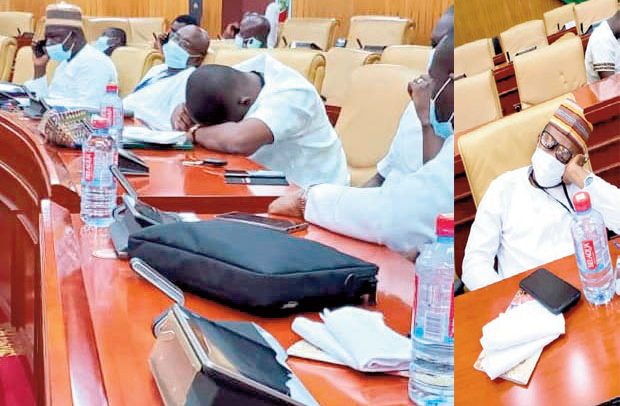A cross section of the NPP MPs sleeping in Parliament yesterday
A number of New Patriotic Party (NPP) Members of Parliament clad in white attires yesterday arrived very early in Parliament to take their rightful place in the chamber which is the majority side.
Some were said to have arrived as early as 2:00am, while majority arrived by 4:00am.
Some of the NPP MPs indicated on their Facebook pages the time they arrived in Parliament to take over the majority side before their colleagues from the National Democratic Congress (NDC) could take them by surprise as it happened on the day the Speaker of Parliament, Alban Bagbin was elected, that was in the early hours of January 7.
The NPP MP for Kwesimintsim in the Western Region, on his Facebook page – @Prince Hamid Armah, wrote “as early as 2:00am this morning, I joined my colleagues on the majority side of the Eight Parliament of the Fourth Republic to take our rightful seats on the right side of Mr. Speaker.
“For the love of the party and our country, we left our homes and came to the House eight hours ahead of schedule, we were determined to ensure that the right thing was done, even if it meant forsaking the comfort of our beds to catch forty winks on our seats in the House.”
The NPP MP for Ablekuma North in the Greater Accra also wrote on her facebook page that she arrived in the House at 4:00am yesterday to join her colleagues to occupy their rightful place in the chamber
As of 8:30am, there were over 70 NPP MPs in Parliament although proceedings were expected to begin at 10:00am.
By the time the NDC MPs arrived in the chamber, the NPP MPs were already seated on the Majority side
The NPP has 137 MPs while the NDC also has 137 MPs with an independent MP who has declared his intention to do business on the Floor with the NPP caucus
Meanwhile the Speaker of Parliament yesterday officially declared the NPP caucus as the Majority Group ending a two-week-old rancour over which of the two major political parties constitutes the Majority side.
As soon as the Speaker declared the NPP as the Majority Caucus in the Eighth Parliament, its members erupted into wild jubilations waving white handkerchiefs.
On the contrary, the NDC MPs, who were in a showdown with their NPP counterparts before the official declaration, momentarily sat in dead silence and melancholic as their NPP counterparts jubilated.
According to him, the NPP caucus in Parliament, together with the independent MP for Fomena, now constitutes the majority group since Mr. Andrew Asiamah Amoako, the independent MP has officially declared to do business with the NPP caucus.
“I, Andrew Asiamah Amoako, an independent Member of Parliament for Fomena Constituency and now the Second Deputy Speaker for the Eighth Parliament, do hereby declare that I shall, for the purposes of transacting business in the House, associate with the NPP Caucus,” Speaker Bagbin read Mr. Amoako’s official communication to the House.
“With this official declaration to the House, the House will accord him the space to do as he has stated. Whatever he said outside was of no effect so far as the business of the House was concerned and therefore he had to do it officially for it to be read and captured in the Hansard.
“And so what we have now, you have the New Patriotic Party (NPP) wing or caucus in Parliament together with the independent Member of Parliament for Fomena and they now constitute the majority group,” he affirmed.
Earlier, the Speaker had called for collaboration and cooperation between both sides of the House, saying that in the 2020 general election, Ghanaians sent a clear message to the political class “when they voted both the NPP and the NDC not to have single-party control of the legislative branch.”
The Speaker urged the leadership of both sides of the House to put their heads together to smoothen out any bottlenecks or challenges that may impede the conduct of business in the House.
“I believe that the people of Ghana, in voting as they did in the last elections, have signaled their frustration with and disapproval of party-first mindset and the associated unbridled partisanship and polarization that have taken root in our politics and have given us the option of parliamentary democracy a bad name.”
By Ernest Kofi Adu and Prince Fiifi Yorke Parliament House

